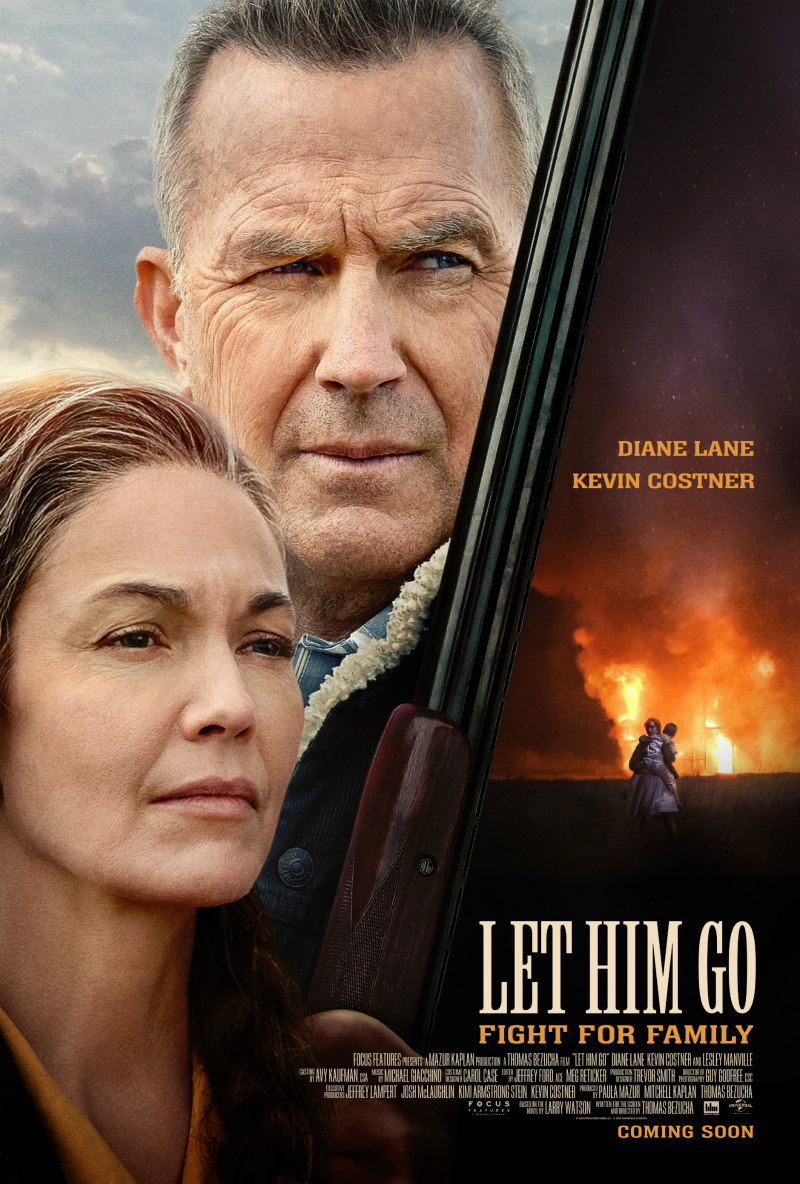
In 1960s North Dakota, a couple attempts to free their grandson from the
clutches of a violent clan.
Review by
Eric Hillis
Directed by: Thomas Bezucha
Starring: Kevin Costner, Diane Lane, Lesley Manville, Jeffrey Donovan, Kayli Carter, Booboo Stewart, Will
Brittain

The hottest screen pairing of 2020 comes not from some toned, youthful
twenty-somethings but rather in the settled faces of the 65-year-old
Kevin Costner and 55-year-old Diane Lane. As the married
couple at the centre of writer/director Thomas Bezucha's adaptation
of Larry Watson's novel Let Him Go, and in their third screen pairing, they fully convince as two people who
have managed that rare feat of growing comfortable with each other while
still being able to surprise one another. The heat generated between the two
is so palpable that when Bezucha cuts away from the beginnings of a motel
tryst, it doesn't feel like a tasteful act but rather one of cowardice, a
missed opportunity to give us a rare scene of lovemaking between two aging
protagonists.

The bond between retired lawman George Blackledge (Costner) and his wife
Margaret (Lane) is tested when the former arrives home to find his wife has
filled their car with provisions for a road trip. Margaret wants to leave
their Montana home to travel to North Dakota in search of their grandson,
who following the death of their own son in a riding accident a couple of
years prior, has ended up in the clutches of the Weboys, a notorious
criminal clan led by domineering matriarch Blanche (Lesley Manville).
George and Margaret have been together long enough to know there are some
questions you can't answer in the negative, and so George agrees. In its own
quiet, cosy way (Margaret bakes a chocolate sponge cake for the trip), it's
reminiscent of The Wild Bunch's famous "Let's go. Why not?" moment. The closer the Blackledges get to
the Weboys, the more we realise it's probably going to require some
bloodshed to extract their kin from Blanche's grasp.

Known for light comedies like Christmas favourite The Family Stone
and the 2011 Selena Gomez vehicle Monte Carlo, Bezucha seems an odd fit to bring such a rugged tale to the screen. But
in a way it works, as he brings the same sort of naivete to the genre that
Margaret brings to her poorly planned rescue mission. There are so many
tender moments between the husband and wife that we almost forget we're
watching what is essentially a 1960s set western. When the violence erupts
in the final act it's all the more shocking, and the stakes have been raised
by how much time we've spent in the company of George and Margaret.
While the central couple is fully realised by an economical but incisive
script and two deceptively impressive performances, the Weboys feel like
they belong in a different movie, especially given Manville's over-the-top
but admittedly arresting portrayal of a rankled hillbilly Momma bear. But
again, this dynamic works. The film takes two recognisably human people and
plants them in the middle of a genre piece. We know what sort of movie
George and Margaret have found themselves in, but we're never quite sure if
they're as cognizant themselves of the looming threat posed by the
Weboys.

George and Margaret aren't entirely likeable however. There's an element of
snobbish entitlement to how they decide their Grandson is better off in
their care than that of his own mother and new stepfather. Of course, their
assumption bears out, but when they behave so ignorantly towards Blanche in
their initial meeting over a dinner of pork chops, we can't help but
empathise a little with Blanche, who immediately twigs them for the middle
class snobs they probably don't realise they've become. A more nuanced movie
might have leaned into this idea, making the film a sort of maternal riff on
The Searchers, but Bezucha leaves it unexplored to such a degree that you have to assume
it's an element of his film he's not actually aware of. Still, as a
straightforward tale of white hats and black hats,
Let Him Go is a gripping modern western anchored by one of the
most textured screen couplings of recent mainstream cinema.

